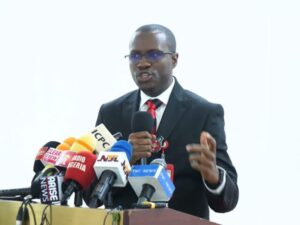Arbitrary taxation: Tinubu signs executive orders
…Suspends 5% excise tax on telecoms, others
…Policy signals current administration committed to creating enabling environment — CPPE
…Suspension of excise duty on telecom lifts burden on operators, consumers — Telecom Operators
…Boost to moribund local content — Ehindero
In line with his administration’s commitment to institute reforms that would engender the sustainable growth and development of the country, President Bola Ahmed Tinubu on Thursday ordered the suspension of the 5 per cent excise duty on telecommunications as well as the Import Tax Adjustment levy on certain vehicles.
Special Adviser, Special Duties, Communication and Strategy, to the President, Dele Alake, announced the policy directive on Thursday during an interactive session with State House Correspondents.
Alake noted that the President signed four executive orders into law to curb arbitrary taxation policy in the country.
Among the Executive Orders signed into law by the President, includes the change in the date of the implementation of the Finance Act, 2023.
Briefing correspondents on the rationale behind President Tinubu’s decision to review some of the tax policies signed by his predecessor, Muhammadu Buhari, Alake said, “You will all recall that prior to the advent of this Administration, certain tax changes were introduced via the Customs, Excise Tariff (Variation) Amendment Order, 2023 (henceforth referred to as ‘the Order’) published on the 8th of May 2023 and the Finance Act, 2023, which was signed into law on the 28th of May 2023.
“Among others, the Order introduced new Excise Duty on Single Use Plastics (SUPs), higher Excise Duties on some locally manufactured products, including alcoholic beverages and tobacco products, and Green Tax by way of Import Tax Adjustment on certain categories of imported vehicles.
“The Tinubu Administration has since noticed that some of the tax policies are being implemented retroactively with their commencement dates, in some instances, pre-dating the official publication of the relevant legal instruments backing the policies. This lacuna has created some challenges of implementation.”
He noted that the intentions behind upward adjustments of some of the taxes are quite noble as they were designed to raise revenue as well as address environmental and public health concerns. However, they have generated some significant challenges for affected businesses and elicited serious complaints amongst key stakeholders and in the business community.
The President also deferred the commencement date of the changes contained in the Act from May 23, 2023, to September 1, 2023.
This is to ensure adherence to the 90 days minimum advance notice for tax changes as contained in the 2017 National Tax Policy.
“Let me mention some of the problems we have identified with the aforementioned tax changes. A document known as the 2017 National Tax Policy approved by the Federal Executive Council of the last administration prescribes a minimum of 90 days’ notice from the government to tax-payers entities before any tax changes can take effect.
“This global practice is done with a view to giving taxpayers and businesses reasonable time to adjust to the new tax regime.
“However, evidencing part of the gaps pointed out earlier, both the Finance Act 2023 and the Customs, Excise Tariff Order 2023 did not give the required minimum notice period, thus putting businesses in violation of the new tax regime even before the changes were gazetted,” he added.
Alake noted that as a result of this, many of the affected businesses are already contending with the rising costs, falling margins and capacity underutilisation due to the various macroeconomic headwinds as well as the impact of the Naira redesign policy.
According to him, “The Excise Tax increases on tobacco products and alcoholic beverages from 2022 to 2024, which had already been approved, are also being implemented but a further escalation of the approved rates by the current Administration presents an image of policy inconsistency and creates an atmosphere of uncertainty for businesses operating in Nigeria.
“The Excise Tax of 5 per cent on telecommunication services has generated heated controversy. There is also a lack of clarity regarding the status of this tax, just as players in the sector also complain about the imposition of multiple taxes on their operations.
“We have also seen that the Green Taxes, including the Single Use Plastics tax and the Import Adjustment Levy on certain categories of vehicles, require more consultation and a holistic approach to the country’s net zero plan in a manner that does not impact the economy negatively,” he said.
Policy signals current administration committed to creating enabling environment — CPPE
In a swift response to the development, Director, Chief Executive Officer Center for the Promotion of Private (CPPE) Muda Yusuf commended President Tinubu for being sensitive to the concerns that have been expressed by the manufacturers and also the citizens.
“As you know, the economy is getting overheated as a result of the inflationary pressure and this has been further compounded by the fuel subsidy removal.
“So, what the President has done is to slow down on some of those additional policies that can put additional pressure on the citizens,” Muda Yusuf said.
He also expressed optimism that, “this is just the beginning, I don’t think this is the end of the measures that the government will introduce because the citizens are expecting palliatives that can bring down the cost of living generally; cost of transportation, cost of energy and cost of food.
“We need to see some additional measures in all those directions too but generally it is a welcome development, it’s good for the industry, it’s good also for signalling to the citizens that the president with the administration is sensitive to the plight of the citizens whether corporate or individuals.
“The issue now is not even about GDP, the issue now is about the business environment, it’s about investments, it’s about the welfare of the people. That is what is most Paramount, not GDP. That is a discerning academia, let us create conditions that are conducive for businesses. Let us create conditions that will not put too much burden on the citizens,” he said.
Suspension of excise duty on telecom lifts burden on operators, consumers – Telecom Operators
Meanwhile, Telecom operators under the aegis of the Association of Licensed Telecommunications Operators of Nigeria (ALTON) revealed that the suspension of the 5 per cent excise duty on telecom services has taken away the burden of collections off the telecom operators and the weight of the subscribers, but there are more tax issues that need to be addressed by the government.
Chairman of the Association, Engr. Gbenga Adebayo noted that the issue of multiple taxation in the telecom industry has been a major challenge.
According to the ALTON Chairman, the telecom operators in Nigeria are currently paying a total of 39 taxes and levies, which need to be addressed by the Tinubu administration.
While noting that the government has acted responsibly by suspending the 5 per cent excise duty, Adebayo said that the tax would have compounded the current woes of many Nigerians who are already battling with the increase in the price of several other products and services.
The ALTON Chairman, while explaining how the tax would have impacted the telecom industry said, “I must also remind you that the burden of that 5 per cent excise duty would have been on the telecom operators while the weight would have been on the subscribers because that would mean that the subscribers would have to pay more while we would have to go through the burden of collection and remitting to the government.
“We think that the government has done well in this regard by taking the burden away. We must also note that the previous administration had granted an exemption of the telecom services from the 5 per cent excise duty. In our understanding, we had advanced the right argument why it shouldn’t happen, but we later heard from the new administration that they were going to withdraw that exemption.
“But the pronouncement they have made today and the executive order signed by the President suggest consistency in government policy, which is commendable. We are pleased about it and we are thankful for the policy consistency.”
Adebayo tasked the Tinubu administration to find a way to reduce the number of taxes being imposed on telecom operators by different levels of government across the country.
“What we will task them on next is to confront the issue of multiple taxation in the telecom industry. We currently as an industry are paying as many as 39 different taxes and levies across the country. There is no industry that can sustain that level of demand from governments at different levels. It is not sustainable and it is also not good for our regulation and for our policy environment.
“When people look at the state of health of the industry, and the behaviour of public actors, these are the indices they check. The multiple taxes make our environment unpredictable. You can’t do planning or projections because you don’t just know what will happen tomorrow. So, we think that the government of the day has a duty to confront this issue of multiple taxation and levies in the telecom industry,” he said.
Adebayo added that the telecom industry should not be treated as an extractive industry as it is neither an oil and gas nor a mineral exploring industry, but an industry providing social services that have impacts on the economy and lives of the people.
He said, “The government has to address tax issues for the state of health of our industry and for the overall benefit of the subscribers.”
…Boost to moribund local content — Ehindero
Also the Executive Director of Nigerian Workforce Strategy and Enlightenment Centre (NIWOSEC), Dr. Kayode Ehindero said that the excise duty suspension on locally produced products will boost business activities and encourage local firms to recuperate from moribund.
He said, “The suspension will cushion the effect of hardship on Nigerians by the Telecom service delivery.”
Dr. Ehindero also tasked President Tinubu to set up a monitoring Committee to ensure implementation and compliance as citizens cannot easily monitor the reduction in their service charges.




